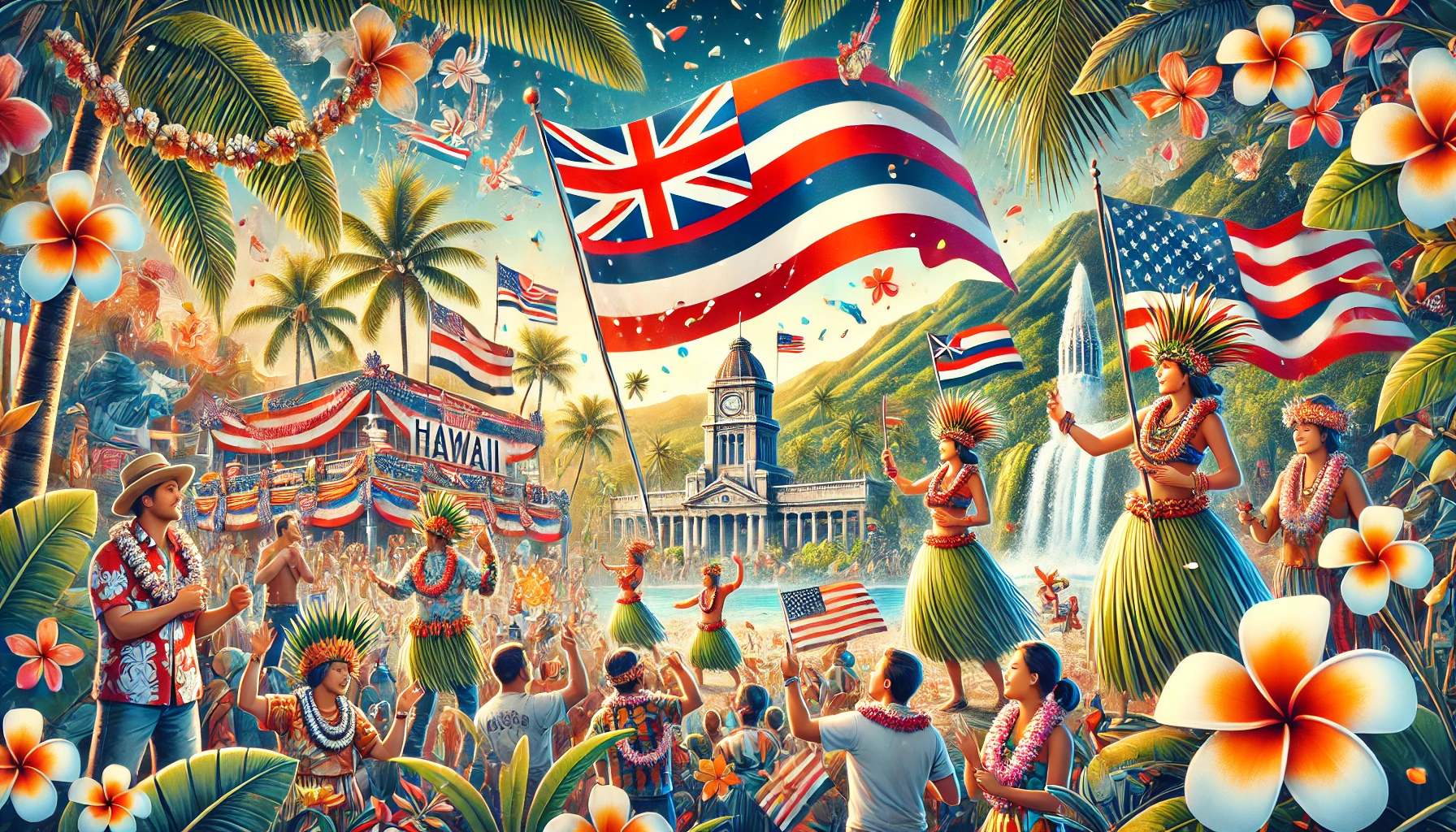
- This event has passed.
Hawaii Statehood Day
August 16

Hawaii Statehood Day is a significant occasion that commemorates the admission of Hawaii as the 50th state of the United States on August 21, 1959. This day serves as a reminder of Hawaii’s journey from a territory to a state, reflecting its rich cultural heritage and diverse history. Residents and visitors alike celebrate this day, honoring the values and traditions that define the Aloha State.
The observance of Hawaii Statehood Day not only recognizes the state’s unique path to statehood but also highlights the importance of unity among its diverse population. It is a time for reflection on the struggles and achievements that have shaped Hawaii’s identity, allowing people to connect with their roots and celebrate the spirit of Aloha.
History and Meaning of Hawaii Statehood Day
The history of Hawaii’s statehood can be traced back to the mid-20th century when the desire for statehood gained momentum. After being annexed by the United States in 1898 and becoming a territory in 1900, Hawaiians sought equal representation and opportunities. The push for statehood intensified during World War II, as the contributions of Hawaii’s people became increasingly evident. In 1959, Congress passed the Hawaii Admission Act, which ultimately led to Hawaii’s formal admission as the 50th state.
Hawaii Statehood Day holds profound meaning for the people of Hawaii, symbolizing the recognition of their culture, history, and contributions to the United States. It serves as a celebration of the unique blend of traditions and influences that make Hawaii a vibrant and distinct state. The day is marked by various events that promote cultural awareness and foster a sense of pride among residents.
Traditions and Rituals Associated with Hawaii Statehood Day
Traditions surrounding Hawaii Statehood Day are deeply rooted in the state’s rich cultural heritage. One of the most prominent customs is the gathering of families and communities to celebrate with music, hula performances, and traditional Hawaiian food. These festivities often take place in parks, community centers, and other public spaces, where people come together to enjoy the spirit of Aloha and honor their shared identity.
Rituals during this day may also include educational programs that focus on Hawaii’s history and culture. Schools and organizations often host events that teach children and adults about the significance of statehood, the importance of cultural preservation, and the diverse heritage of the islands. These activities help foster a sense of belonging and pride among participants.
Modern Celebration of Hawaii Statehood Day
Today, Hawaii Statehood Day is celebrated with a variety of events that reflect the spirit of the islands. Parades, concerts, and festivals take place across the state, showcasing local artists, musicians, and performers. These events not only celebrate the state’s history but also promote local businesses and artisans, contributing to the economic vitality of the community.
Social media plays a significant role in modern celebrations, with residents sharing their experiences and photos online. This digital engagement allows people to connect with others who share a love for Hawaii and its culture, further strengthening the sense of community. As Hawaii continues to evolve, the celebration of Statehood Day adapts to reflect contemporary values while honoring traditional practices.
10 Congratulations and Wishes
- Happy Hawaii Statehood Day! May the spirit of Aloha fill your heart today and always.
- Wishing you a joyous celebration of our beautiful state’s history and culture on Hawaii Statehood Day!
- On this special day, let’s embrace the diversity and unity that make Hawaii a remarkable place to live.
- Happy Hawaii Statehood Day! May your day be filled with laughter, love, and the warmth of the islands.
- Celebrating the beauty of Hawaii today! Wishing you happiness and Aloha on this Statehood Day.
- Here’s to the 50th state! May we continue to cherish and preserve our unique heritage.
- Happy Statehood Day! Let’s celebrate the strength and resilience of our community together.
- On this Hawaii Statehood Day, may you find joy in the traditions that connect us all.
- Wishing you a fantastic celebration filled with music, dance, and the spirit of Aloha!
- Happy Hawaii Statehood Day! May we continue to honor our past while looking forward to a bright future.
10 Unusual Facts About Hawaii Statehood Day
- Hawaii was the last state to join the United States, becoming the 50th state on August 21, 1959.
- The push for statehood began as early as the 1930s, but it took nearly three decades for Hawaii to gain admission.
- Hawaii is the only state that grows coffee commercially, and it’s also famous for its sugarcane plantations.
- The Hawaiian language has a rich history and is one of the official languages of the state, alongside English.
- The state flag of Hawaii features the Union Jack, a nod to its historical ties with Great Britain.
- Hawaii has its own unique statehood song, “Hawaii Aloha,” which is often sung at state events.
- The celebration of Hawaii Statehood Day varies by island, with each community incorporating its own customs and traditions.
- Many residents celebrate by wearing aloha shirts and leis, symbolizing the islands’ vibrant culture.
- Hawaii has a higher percentage of multiracial individuals compared to any other state in the U.S.
- The 50th anniversary of statehood was celebrated with a statewide festival in 2009, highlighting Hawaii’s culture and history.
10 Frequently Asked Questions About Hawaii Statehood Day
- What is Hawaii Statehood Day? Hawaii Statehood Day commemorates the admission of Hawaii as the 50th state of the United States on August 21, 1959.
- Why is Hawaii Statehood Day celebrated? It is celebrated to honor Hawaii’s journey to statehood, recognize its cultural heritage, and promote unity among its diverse population.
- How is Hawaii Statehood Day celebrated? Celebrations include parades, concerts, cultural performances, and family gatherings, often accompanied by traditional Hawaiian food.
- Is Hawaii Statehood Day a public holiday? Yes, it is recognized as a public holiday in Hawaii, though not all businesses may close for the day.
- What are some common traditions associated with the day? Common traditions include hula performances, music, educational programs, and community gatherings.
- Can visitors participate in Hawaii Statehood Day celebrations? Yes, visitors are welcome to join the festivities and experience the rich culture of Hawaii.
- What role does social media play in the celebrations? Social media allows residents to share their experiences and photos, fostering a sense of community and connection.
- Are there any special events held on this day? Yes, many communities host special events, such as cultural festivals, educational programs, and concerts.
- What is the significance of the Hawaiian language on this day? The Hawaiian language is an important part of the state’s identity and is often featured in celebrations, emphasizing cultural preservation.
- How has the celebration of Hawaii Statehood Day evolved over the years? The celebration has adapted to include modern elements while honoring traditional practices, reflecting the changing dynamics of Hawaiian society.
Hawaii Statehood Day is more than just a celebration; it is a vital reminder of the unique journey that Hawaii has undertaken. It emphasizes the importance of community, cultural identity, and the values that define the state. This day serves as an opportunity for residents to reflect on their shared history and the diverse influences that have shaped their lives.
In my opinion, Hawaii Statehood Day is crucial not only for celebrating the past but also for inspiring future generations. By fostering a sense of pride and connection to their roots, the people of Hawaii can continue to promote unity, respect, and love for their islands, ensuring that the spirit of Aloha endures for years to come.




